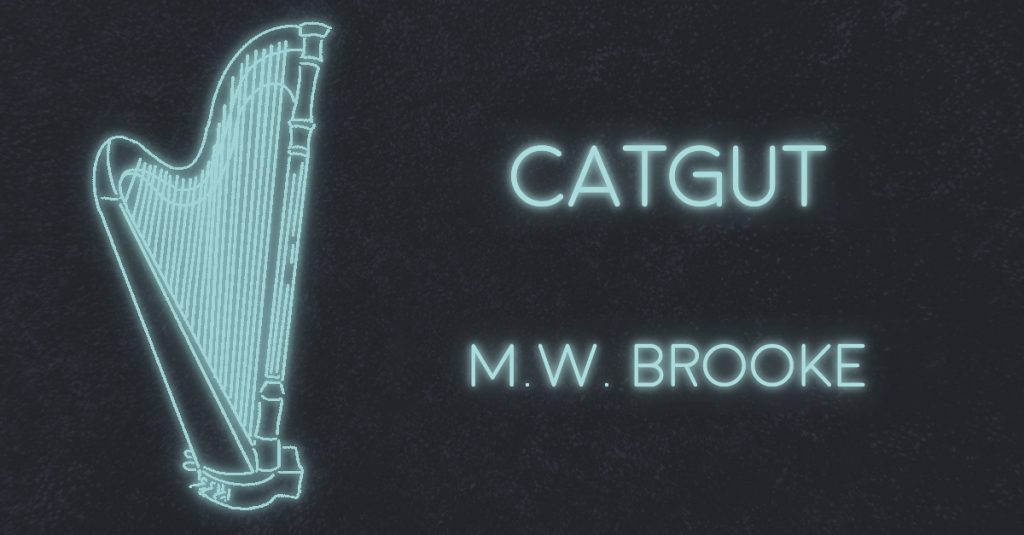Most days your mother languishes on your couch watching reruns of Law & Order. Doctors can’t explain what’s wrong with her brain. You drive her to appointment after appointment between harp lessons—a merry-go-round of CAT scans, MRIs, acupuncture, marijuana, experimental doses of ketamine, prescriptions for epileptics. Nothing calms the tension behind her eye sockets, like a harp string constricting under the chill of night.
During rehearsals in third grade, your fourth octave C string snapped from the tuning pin and whipped across your eye. The harp yowled in your arms, a feral cat too close to human hands. Harp strings are more likely to snap when you aren’t playing them, your teacher said, indifferent, swiveling on her heel to correct the posture of the student beside you. A few girls set their harps on the floor and stared, mouths agape as a red line marked your swelling cheek like a jellyfish sting. The quiver of Mormon girls giggled into their skinny collarbones.
For years you played pretentious recitals in ball gowns a hopeful size too small, back straight, elbows out, bouncing ringlets from too-tight rollers your mother forced you into the night before. Now you heave your harps up and down flights of stairs in yoga pants, your spine aching. You know the shape of each harp better than your own body, how each one travels, how to angle them into your Subaru Outback. Your students don’t understand how fragile your harps are. Or maybe they don’t care, too busy fluttering between controlling parents or abusive boyfriends. But they insist on dragging your harps along with them all the same, those downy notes softening the razor’s edge of existence. You teach scales and glissandi and arpeggios and “Aura Lee” to children who hold back tears when their mothers’ cars pull into your driveway.
You lost one of your rental fleet once—an expensive lever loaned to a student who fixated on her fingers whenever a black eye bullied past layers of concealer. She skipped town with your harp, and the police contacted you six months later to tell you she had been found dead in her apartment. “You don’t want the harp back,” they said. Its porous wood had breathed in months of human decay.
When you were fifteen, your mother drove you home from a recital in a freak blizzard in May, her knuckles like knobs of white coral against the steering wheel as snow piled on the windshield between each scrape of the wipers. A few miles from home, she pulled over to the shoulder and breathed out like air let out of a tire. Car still running and blinker clicking away, she opened the door and shuffled in front of the headlights. She lifted her arms to the sky and started to twirl, snow fluttering around her like TV static. Isn’t it beautiful? she said. You shrunk into the crook of the passenger seat and yelled at her to come back inside, embarrassed and scared of how much you loved her.
Now your mother sleeps in the guest room, fetal and withering. Her muscles atrophy and her belly sags like a bird nest built on the lip of an eave. You’re awake in the dark, arranging in your head a shitty pop song your ten-year-old student insists on learning. Crickets saw their legs together outside your window—the same, maddening refrain. And then you hear it: downstairs, a wooden crack like a rotting bough giving way to gravity’s pull. It’s sharp and urgent and hollow. You slip out of bed and touch the strings in the dark until you find the empty space like a missing tooth. The string’s nowhere to be found, impossibly unmoored from the soundboard and tuning pin. You imagine the harp string unfurling on its own and shooting somewhere between the couch cushions or behind the piano. You could search for it. You could make a game out of it with your mother tomorrow if her brain doesn’t rebel. Or maybe you’ll find it months from now, coiled on the windowsill like a shed snakeskin. Maybe you’ll never find it, another secret kept between the catgut, the woodgrain, the levers and pedals.

